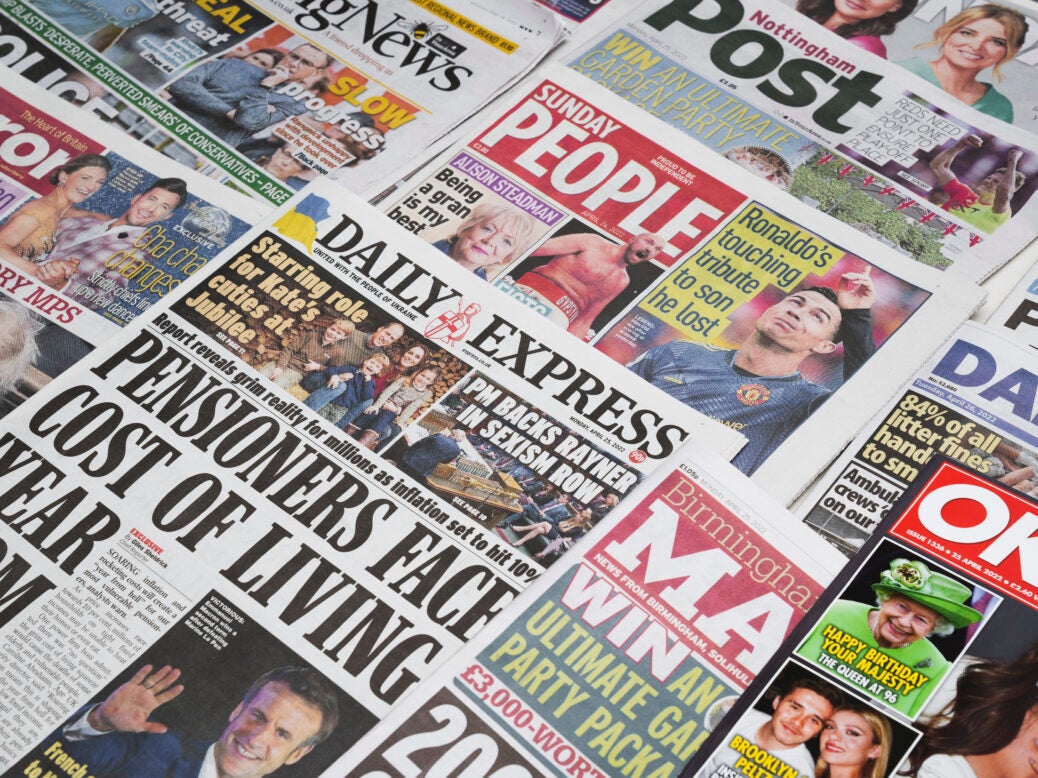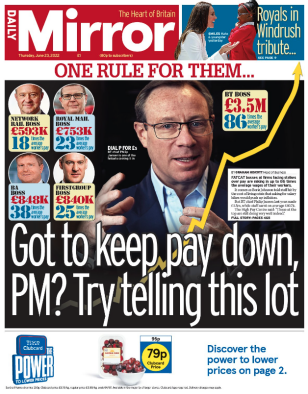
Update 3, 12/9/22: A further three-day strike has been put on hold as the NUJ ballots its members at Reach over a new proposal on pay put forward by the company.
The walkout was scheduled for Wednesday to Friday 14 to 16 September.
A “work to rule” period has also been postponed until at least after the funeral of The Queen on 19 September.
A Reach spokesperson said: “We have been working on a number of proposals to resolve this dispute and can share that the NUJ have agreed to take a proposal to their members for ballot.
“This is a significant step and we are hopeful for a resolution.”
The ballot of staff on the new offer by Reach will open on 14 September and end at 12pm on 23 September.
Update 2, 30/8/22: Reach journalists will walk out on Wednesday (31 August) after talks over the bank holiday weekend with arbitration service ACAS fell through.
The NUJ said its reps had passed a unanimous vote of no confidence in Reach chief executive Jim Mullen as a result as general secretary Michelle Stanistreet claimed he “kiboshed any chance of a sensible deal that addresses our members’ key priority – their consolidated pay”. NUJ members voted to reject a 3% pay offer from the company.
Stanistreet added: “Failure to resolve this dispute represents a monumental failure of leadership on his part.”
Hundreds of journalists will now strike for an extra day, for three days in a row from Tuesday 13 September to Thursday 15 September. They will also take part in an extended “work to rule” (meaning working only contracted hours and duties) from Thursday after Wednesday’s strike ends, and on an ongoing basis from Friday 16 September.
A Reach spokesperson said the company had offered a new career framework with clear salary progressions for journalists as part of the talks.
They said: “Over the weekend we have been in discussions with the NUJ in hope of avoiding industrial action, but unfortunately these talks have ended without agreement.
“We were able to meet the majority of requirements put forward by the NUJ and proposed an accelerated career development framework that would have set out clearer salary progression for journalists, so we are disappointed that our offer was rejected.
“We remain open to talks at any time to resolve this dispute and to begin to deliver these substantial improvements for our journalists.
“Our priority continues to be to protect the interests of all our colleagues and stakeholders, ensuring the group has a sustainable future in the face of an uncertain economic backdrop.”
Update 1, 26/8/2022: A proposed walkout involving more than 1,000 journalists on Reach national and regional titles was called off at the 11th hour.
Strike action was due to commence on 26 August but Reach and the NUJ have agreed instead to hold more talks.
A spokesman for Reach said: “We are pleased to report that the NUJ have accepted our offer to meet with ACAS for further talks, in hope of a resolution. This means that the industrial action planned for Friday 26th August has been postponed while we plan to meet with the NUJ at the earliest opportunity. This is a positive and significant step in finding a way forward for everyone.”
Original story (published 12 August): National and regional journalists at Reach have voted to strike starting this month over a “meagre” 3% pay rise offer.
The National Union of Journalists said it had given immediate formal notice of strike action so that the situation does not “drag on” amid growing cost of living pressures, but added it wanted to continue negotiations with the company to reach a “fair and increased” pay offer.
Strike action is currently planned to take place all day on Friday 26 August and Wednesday 31 August, and for 48 hours on 14 and 15 September.
There will also be action short of a strike under “work to rule”, meaning following contracted working hours only, from 1 to 13 September.
Reach, which is the biggest commercial publisher in the UK with the national Mirror, Express and Star titles as well as a network of more than 100 regional news brands, said its focus was on ensuring the group has a “sustainable future” and that it had contingency plans to minimise disruption in the event of a strike.
The publisher offered staff a pay increase of 3%, or £750 minimum, which the NUJ said was not enough given the rising cost of living and inflation. Last year staff received a 1% increase, or £350.
In total 79% of Reach’s eligible NUJ members voted in favour of strike action, while 88% voted in favour of action short of a strike.
The NUJ said the ballot, which closed on Friday, had a 70% turnout of members in the UK where 749 people voted.
NUJ Reach national coordinator Chris Morley said the journalists had sent a “powerful message”, adding: “With this result, our members are clearly saying that the company – which gave its top two executives pay packages worth more than £7m – can, and must, do much better than a meagre 3%/£750 minimum increase on already inadequate pay.
“We very much hope that the company has the good grace and humility to recognise it made a mistake in making this poor offer against the backdrop of this cost-of-living turmoil. And rather than trigger the planned damaging walkouts by doing nothing, senior management are urged to now come forward with meaningful proposals to resolve the dispute.
“The NUJ is ready and willing to achieve a negotiated settlement. But for that to happen, the company will need to understand that our members are prepared to stand up and be counted and are not willing to merely accept the crumbs off the millionaires’ table.
“Our members earn very modest pay for the vital – but stressful – part they play in keeping the public informed around the clock. They know that a company that can make a £14m half-year dividend payment to shareholders next month can do more to make its journalists’ salaries more competitive.”
The 3% pay deal has already been accepted by the British Association of Journalists, which is the recognised union at the Mirror and the only non-NUJ bargaining unit for journalists within Reach. However Mirror journalists who are members of the NUJ were still able to take part in the ballot.
A Reach spokesperson said: “We greatly value our journalists and are disappointed that, despite our best efforts during the negotiation process and successful agreements with Unite and the BAJ, we have been unable to reach an agreement with the NUJ.
“Whilst this is not the outcome we would have wished for, we remain focused on protecting the interests of all our colleagues, ensuring the group has a sustainable future in the face of an uncertain economic backdrop.
“We have contingency plans in place to keep disruption to our titles to a minimum and are working to support our journalists who choose not to take action.”
In June the NUJ’s local chapel representatives within Reach rejected the 3% pay offer by a ratio of four to one.

Daily Mirror front page on 23 June 2022
The pay offer was rejected shortly after a Daily Mirror front page about fat cat pay that attacked five chief executives earning up to 86 times their average workers’ salaries. Press Gazette analysis earlier this year found that Reach chief executive Jim Mullen was earning 104 times more than his median employee.
The NUJ Reach group chapel passed a motion in response stating that it “applauds the journalism behind” the splash but that “the hypocrisy between the Mirror’s editorial line and Reach plc’s corporate policy is breath-taking and serves to badly erode the brand’s credibility in the eyes of the public and those of its staff”.
The group chapel passed another motion last week urging Mullen and chief financial officer Simon Fuller to “reinvest their pay package excesses to help fund a fair pay rise for 2022 for the editorial workforce”. They urged the bosses to follow the lead of Financial Times chief executive John Ridding who in 2018 gave back a six-figure pay rise after objections from staff.
Earlier in the week journalists at National World in Scotland, on titles including The Scotsman and Edinburgh Evening News, voted in favour of strike action over a digital proposal that involves compulsory redundancies.
Picture: Reach
Email pged@pressgazette.co.uk to point out mistakes, provide story tips or send in a letter for publication on our "Letters Page" blog
